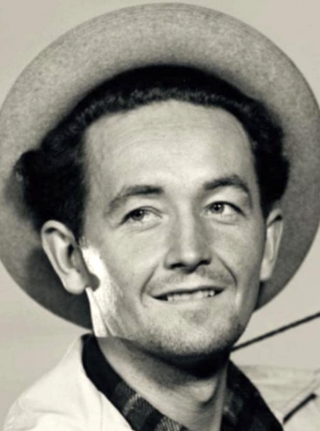On this date in 1912, singer-songwriter Woodrow Wilson Guthrie was born in Okemah, Okla., to musically inclined parents Nora Belle (Sherman) and Charles Guthrie. It’s hard to categorize Guthrie, who rose to fame during the Great Depression as champion of the dispossessed and downtrodden, as one thing or another. He was poet, philosopher, political revolutionary, environmentalist, an admirer of Jesus Christ who scorned organized religion.
His life was filled with tragedy early on and ended that way. His sister fatally set herself on fire during an argument with their mother when he was 7, his father was severely burned in a home fire and Woody’s firstborn died at age 4 when she was burned in an electrical fire. His mother was committed to the Oklahoma Hospital for the Insane when he was 14, while he unknowingly carried the Huntington’s chorea gene that killed them both after long hospitalizations.
Musically inclined like his parents, he dropped out of high school as a senior and began playing for dances with his uncle in Texas. He married Mary Jennings in 1931. They divorced in 1940. He married twice more, to Marjorie Greenblatt (1945–53) and Anneke Van Kirk (1953–56), fathering eight children.
He had headed to California in the Dust Bowl migration, leaving the family temporarily in Texas. He hosted a “hillbilly” music radio show, made friends with people like Will Geer and John Steinbeck and wrote a column titled “Woody Sez” for the communist newspaper People’s World in 1939-40 but never joined the political party. He joined the U.S. Merchant Marine in 1943 and was drafted into the Army in 1945. He wrote patriotic songs backing the U.S. fight against fascism.
Guthrie wrote what became “This Land Is Your Land,” arguably his most famous song, in February 1940. Tired of hearing Kate Smith sing “God Bless America” on the radio, he sarcastically called his song “God Blessed America for Me” before renaming it when it was first recorded in 1944, when God was excised from the title and lyrics. As originally written, it said:
One bright sunny morning in the shadow of the steeple
By the Relief Office I saw my people —
As they stood hungry, I stood there wondering if
God blessed America for me.
Guthrie wrote over 3,000 song lyrics, including fanciful ones for children, songs which have influenced succeeding generations of musicians, most personally his son Arlo. His first album, “Dust Bowl Ballads” (1941), sold more than any other. His songs took the side of the economic refugees and those beset by tragedy against the “interests” and bankers. A line in “Pretty Boy Floyd” sums it up: “Some will rob you with a six-gun / And some with a fountain pen.” He also published two novels, created artworks and wrote numerous published and unpublished manuscripts, poems, prose and plays. Over 400 of his songs are in the Library of Congress.
Baptized as a young adult, he never attended church on a regular basis. Asked once to name the people he most admired, he replied, “Will Rogers and Jesus Christ.” (Ron Briley, History News Network, 2005) To him, Jesus was a working-class carpenter who championed the common people and was betrayed by the rich and their selfish interests.
In Born To Win (ed. Robert Shelton, 1965), Guthrie wrote: “Fear before none. Quiver before nothing. Kneel at no spot. Beg no cure. Be a slave to none and master to none. … Love is the only God I’ll ever believe in.” He came to that conclusion, trying to define what God meant to him, “when I was ready to throw so-called fearful cowardly thieving poisoning religion out my back door.” He once said that while he rarely darkened the door of a church, he “always had a deep love for people who go there.”
By the late 1940s, Guthrie’s health was declining and his behavior was becoming extremely erratic, with loss of muscle control and increasing inability to speak. He was diagnosed with Huntington’s and was hospitalized for 12 years from 1956 until his death at age 55 at Creedmoor Psychiatric Center in Queens Village, N.Y., where the 19-year-old Bob Dylan had visited him in 1960. His ashes were sprinkled into the waters off Coney Island, where he had once lived. D. 1967.

